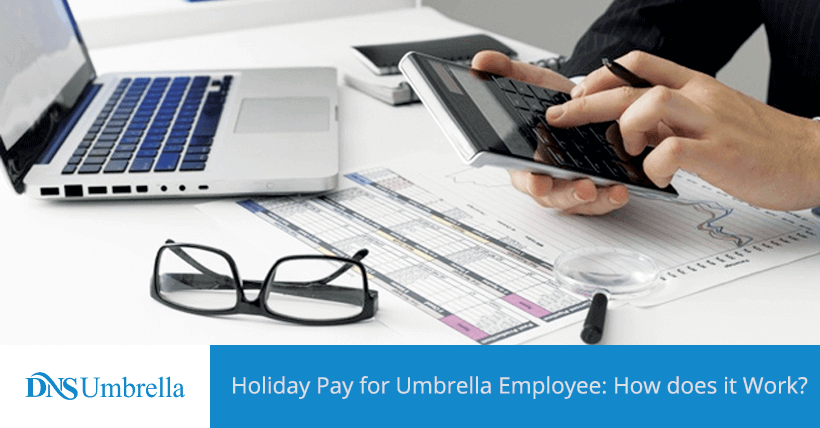In a world where nothing can be done without contractors, taking a break is significantly important for all working individuals. However, what contractual workers are unaware of is the holiday pay offered to umbrella employees.

By every definition in the book, contracting should mean availing holiday time more flexibly. Employees could either arrange time off by postponing the commencement of another contract or taking a significant gap between contracts. In a more productive sense, contract-based workers can single out the contracts they wish to work for. They additionally do not have to stress over getting vacation time or endorsements for holidays from companies.
However, individuals conceive the concept of contract-based work with a broken understanding. The brutal truth is that downtime for contractual workers just speaks to a gap in their salary, which for some people is not reasonable. Contrarily, contractual workers using umbrella money can leverage the benefits of holiday pay to finance their recreational time-offs.
Holiday Pay
Holiday pay means weekly pay entitlement for each week of statutory leave taken by a worker. Most workers are entitled to a paid holiday of 5.6 weeks in a year. One of the primary advantages of contracting is that you can go on holiday at your convenience.
Understanding holiday pay
- Similar to employment costs, holiday pay is charged at the contract rate that your umbrella company gets from your registered office or end-customers.
- Holiday pay is usually accrued from your pay and paid to you when you go on holiday (except if you wish to receive rolled-up pay where the funds are paid to you as part of your weekly or monthly pay).
- It is just a reassignment of your cash, and it is the reason why it appears under a separate line on your payslip.
Also See: All You Need To Know About CIS Umbrella
How is Holiday Pay Determined?
- Since April 2009, all PAYE representatives/employees are qualified for 5.6 weeks paid holiday every year.
- It is further worked out at 5.6 times the multi-day working week, allowing you to take 28 offs every year (including bank holidays).
- Most umbrella companies will typically work out Holiday Pay as 12.07% of your hourly rate (14.36% for teachers and 15.22% for NHS workers).
Calculation to work out Holiday pay
Holiday pay is calculated as -
5.6 weeks (the statutory minimum) divided by the number of weeks left over after deducting the statutory minimum number of weeks i.e. 5.6 weeks from the total weeks in a year (52 - 5.6 = 46.4 weeks).
5.6/46.4 weeks = 12.07% of your available gross compensation.
However, if contractual employees work for a few days per week or half of the year, their holiday allowance will be determined on a pro-rata basis.
Also See: How To Choose An Umbrella Company?
By what means will Holiday Pay be paid to you?
There are two ways by which you can have your Holiday Pay dispensed, and the most consistent umbrella companies will provide you with alternatives. Note that you will not be better or worse off by choosing one payment alternative over the other. Both strategies reflect the same objectives, and the sum paid to you under each scheme will be identical.
- Paid in Advance (rolled-up pay)
You can select to have your Holiday Pay dispensed ahead of time (in advance)–so you are consistently fully informed regarding any privilege owed. In case you decide to be paid ahead of time, your Holiday Pay will be deposited alongside your salary every week/month.
- Accrued
If you decide to collect Holiday Pay on an accrual basis, it implies that as opposed to having it paid alongside your salary every week/month, it will be held until you choose to have it paid to you as a single amount when you go on holiday. If you do not go on holiday and pull back the cash, it will be paid to you toward the end of the financial year or at the termination of your contract term.
Also See: Can I Make Personal Pension Contributions Through Umbrella?
Why does Holiday Pay appear as a different component on the payslip
As part of the Working Time Regulations (WTR), Holiday Pay cannot be incorporated as a component of your basic salary. Compliant umbrella companies will specify Holiday Pay under a separate line on your payslip. As Holiday Pay is likewise recorded on your payslip, it implies you will consistently have a record to refer back to indicating the gross amount you have received.
As an umbrella employee, you are legitimately qualified for holiday pay. You can utilise this pool to cover time off rather than killing your income stream by arranging ordinary and poorly designed gaps between contracts. In a general sense, this makes taking regular breaks significantly more practical and conceivable. Holiday pay permits you to go on holiday when you believe you need it without imperiling your funds.
For more information on holiday pay, please contact us to speak to one of our specialist advisors.